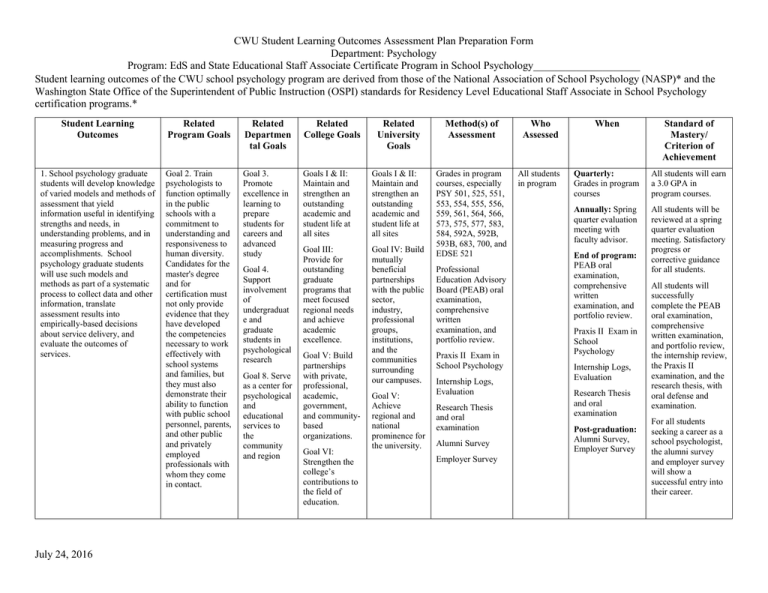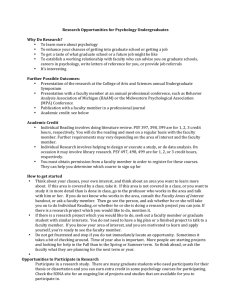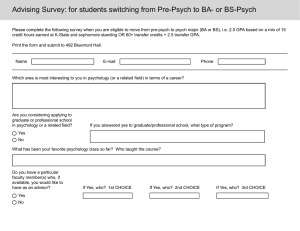CWU Student Learning Outcomes Assessment Plan Preparation Form Department: Psychology
advertisement

CWU Student Learning Outcomes Assessment Plan Preparation Form Department: Psychology Program: EdS and State Educational Staff Associate Certificate Program in School Psychology____________________ Student learning outcomes of the CWU school psychology program are derived from those of the National Association of School Psychology (NASP)* and the Washington State Office of the Superintendent of Public Instruction (OSPI) standards for Residency Level Educational Staff Associate in School Psychology certification programs.* Student Learning Outcomes Related Program Goals Related Departmen tal Goals Related College Goals 1. School psychology graduate students will develop knowledge of varied models and methods of assessment that yield information useful in identifying strengths and needs, in understanding problems, and in measuring progress and accomplishments. School psychology graduate students will use such models and methods as part of a systematic process to collect data and other information, translate assessment results into empirically-based decisions about service delivery, and evaluate the outcomes of services. Goal 2. Train psychologists to function optimally in the public schools with a commitment to understanding and responsiveness to human diversity. Candidates for the master's degree and for certification must not only provide evidence that they have developed the competencies necessary to work effectively with school systems and families, but they must also demonstrate their ability to function with public school personnel, parents, and other public and privately employed professionals with whom they come in contact. Goal 3. Promote excellence in learning to prepare students for careers and advanced study Goals I & II: Maintain and strengthen an outstanding academic and student life at all sites Goals I & II: Maintain and strengthen an outstanding academic and student life at all sites Goal III: Provide for outstanding graduate programs that meet focused regional needs and achieve academic excellence. Goal IV: Build mutually beneficial partnerships with the public sector, industry, professional groups, institutions, and the communities surrounding our campuses. July 24, 2016 Goal 4. Support involvement of undergraduat e and graduate students in psychological research Goal 8. Serve as a center for psychological and educational services to the community and region Goal V: Build partnerships with private, professional, academic, government, and communitybased organizations. Goal VI: Strengthen the college’s contributions to the field of education. Related University Goals Goal V: Achieve regional and national prominence for the university. Method(s) of Assessment Who Assessed When Standard of Mastery/ Criterion of Achievement Grades in program courses, especially PSY 501, 525, 551, 553, 554, 555, 556, 559, 561, 564, 566, 573, 575, 577, 583, 584, 592A, 592B, 593B, 683, 700, and EDSE 521 All students in program Quarterly: Grades in program courses All students will earn a 3.0 GPA in program courses. Annually: Spring quarter evaluation meeting with faculty advisor. All students will be reviewed at a spring quarter evaluation meeting. Satisfactory progress or corrective guidance for all students. Professional Education Advisory Board (PEAB) oral examination, comprehensive written examination, and portfolio review. Praxis II Exam in School Psychology Internship Logs, Evaluation Research Thesis and oral examination Alumni Survey Employer Survey End of program: PEAB oral examination, comprehensive written examination, and portfolio review. Praxis II Exam in School Psychology Internship Logs, Evaluation Research Thesis and oral examination Post-graduation: Alumni Survey, Employer Survey All students will successfully complete the PEAB oral examination, comprehensive written examination, and portfolio review, the internship review, the Praxis II examination, and the research thesis, with oral defense and examination. For all students seeking a career as a school psychologist, the alumni survey and employer survey will show a successful entry into their career. Student Learning Outcomes Related Program Goals Related Departmen tal Goals Related College Goals 2. School psychology graduate students will develop knowledge of behavioral, mental health, collaborative, and/or other consultation models and methods and of their application to particular situations. School psychology graduate students will collaborate effectively with others in planning and decisionmaking processes at the individual, group, and system levels. Same as Student Learning Outcome 1, above. Same as Student Learning Outcome 1, above. Same as Student Learning Outcome 1, above. 3. School psychology graduate students will develop knowledge of human learning processes, techniques to assess these processes, and direct and indirect services applicable to the development of cognitive and academic skills. School psychology graduate students will, in collaboration with others, develop appropriate cognitive and academic goals for students with different abilities, disabilities, strengths, and needs; implement interventions to achieve those goals; and evaluate the effectiveness of interventions. Such interventions include, but are not limited to, instructional interventions and consultation. Same as Student Learning Outcome 1, above. July 24, 2016 Related University Goals Same as Student Learning Outcome 1, above. Method(s) of Assessment Who Assessed When Standard of Mastery/ Criterion of Achievement Grades in program courses, especially PSY 501, 551, 554, 556, 559, 560, 561, 564, 566, 575, 577, 583, 592A, 592B, and 683. All students in program Schedule as shown for Student Learning Outcome 1. Standards as shown in Student Learning Outcome 1. All students in program Schedule as shown for Student Learning Outcome 1. Standards as shown in Student Learning Outcome 1. Other assessments as listed in Student Learning Outcome 1: PEAB evaluation, Praxis II, internship, thesis, alumni and employer surveys. Same as Student Learning Outcome 1, above. Same as Student Learning Outcome 1, above. Same as Student Learning Outcome 1, above. Grades in program courses, especially PSY 525, 551, 552, 554, 556, 559, 564, 566, 573, 575, 577, 583, 592A, 592B, 683, EDF 507, and EDSE 521. Other assessments as listed in Student Learning Outcome 1: PEAB evaluation, Praxis II, internship, thesis, alumni and employer surveys. Student Learning Outcomes Related Program Goals Related Departmen tal Goals Related College Goals 4. School psychology graduate students will develop knowledge of human developmental processes, techniques to assess these processes, and direct and indirect services applicable to the development of behavioral, affective, adaptive, and social skills. School psychology graduate students will be able to collaborate with others, develop appropriate behavioral, affective, adaptive, and social goals for students of varying abilities, disabilities, strengths, and needs; implement interventions to achieve those goals, and evaluate the effectiveness of interventions. Such interventions include, but are not limited to, consultation, behavioral assessment/intervention, and counseling Same as Student Learning Outcome 1, above. Same as Student Learning Outcome 1, above. Same as Student Learning Outcome 1, above. 5. School psychology graduate students will develop knowledge of individual differences, abilities, and disabilities and of the potential influence of biological, social, cultural, ethnic, experiential, socioeconomic, gender-related, and linguistic factors in development and learning. School psychology graduate students will demonstrate the sensitivity and skills needed to work with individuals of diverse characteristics and to implement strategies selected and/or adapted based on individual characteristics, strengths, and needs. Same as Student Learning Outcome 1, above. July 24, 2016 Related University Goals Same as Student Learning Outcome 1, above. Method(s) of Assessment Who Assessed When Standard of Mastery/ Criterion of Achievement Grades in program courses, especially PSY 551, 552, 554, 559, 561, 566, 573, 575, 577, 583, 584, 592A, 592B, 683, EDF 507, and EDSE 521. All students in program Schedule as shown for Student Learning Outcome 1. Standards as shown in Student Learning Outcome 1. All students in program Schedule as shown for Student Learning Outcome 1. Standards as shown in Student Learning Outcome 1. Other assessments as listed in Student Learning Outcome 1: PEAB evaluation, Praxis II, internship, thesis, alumni and employer surveys. Same as Student Learning Outcome 1, above. Same as Student Learning Outcome 1, above. Same as Student Learning Outcome 1, above. Grades in program courses, especially PSY 501, 525, 551, 552, 554, 556, 559, 564, 566, 575, 577, 578, 592A, 592B, 683, EDF 507, and EDSE 521. Other assessments as listed in Student Learning Outcome 1: PEAB evaluation, Praxis II, internship, thesis, alumni and employer surveys. Student Learning Outcomes Related Program Goals Related Departmen tal Goals Related College Goals 6. School psychology graduate students will develop knowledge of general education, special education, and other educational and related services. They understand schools and other settings as systems. School psychology graduate students will work with individuals and groups to facilitate policies and practices that create and maintain safe, supportive, and effective learning environments for children and others. Same as Student Learning Outcome 1, above. Same as Student Learning Outcome 1, above. Same as Student Learning Outcome 1, above. 7. School psychology graduate students will develop knowledge of human development and psychopathology and of associated biological, cultural, and social influences on human behavior. School psychology graduate students will provide or contribute to prevention and intervention programs that promote the mental health and physical well-being of students. Same as Student Learning Outcome 1, above. July 24, 2016 Related University Goals Same as Student Learning Outcome 1, above. Method(s) of Assessment Grades in program courses, especially PSY 501, 583, 592A, 592B, and 683. Who Assessed When Standard of Mastery/ Criterion of Achievement All students in program Schedule as shown for Student Learning Outcome 1. Standards as shown in Student Learning Outcome 1. All students in program Schedule as shown for Student Learning Outcome 1. Standards as shown in Student Learning Outcome 1. Other assessments as listed in Student Learning Outcome 1: PEAB evaluation, Praxis II, internship, thesis, alumni and employer surveys. Same as Student Learning Outcome 1, above. Same as Student Learning Outcome 1, above. Same as Student Learning Outcome 1, above. Grades in program courses, especially PSY 501, 551, 552, 554, 559, 561, 575, 577, 578, 583, 584, 592A, 592B, and 683. Other assessments as listed in Student Learning Outcome 1: PEAB evaluation, Praxis II, internship, thesis, alumni and employer surveys. Student Learning Outcomes Related Program Goals Related Departmen tal Goals Related College Goals 8. School psychology graduate students will develop knowledge of family systems, including family strengths and influences on student development, learning, and behavior, and of methods to involve families in education and service delivery. School psychology graduate students will work effectively with families, educators, and others in the community to promote and provide comprehensive services to children and families. Same as Student Learning Outcome 1, above. Same as Student Learning Outcome 1, above. Same as Student Learning Outcome 1, above. 9. School psychology graduate students will develop knowledge of research, statistics, and evaluation methods. School psychologists evaluate research, translate research into practice, and understand research design and statistics in sufficient depth to plan and conduct investigations and program evaluations for improvement of services. Same as Student Learning Outcome 1, above. July 24, 2016 Related University Goals Same as Student Learning Outcome 1, above. Method(s) of Assessment Who Assessed When Standard of Mastery/ Criterion of Achievement Grades in program courses, especially PSY 501, 551, 583, 592A, 592B, and 683. All students in program Schedule as shown for Student Learning Outcome 1. Standards as shown in Student Learning Outcome 1. All students in program Schedule as shown for Student Learning Outcome 1. Standards as shown in Student Learning Outcome 1. Other assessments as listed in Student Learning Outcome 1: PEAB evaluation, Praxis II, internship, thesis, alumni and employer surveys. Same as Student Learning Outcome 1, above. Same as Student Learning Outcome 1, above. Same as Student Learning Outcome 1, above. Grades in program courses, especially PSY 551, 553, 555, 559, 564, 566, 592A, 592B, 683, and 700. Other assessments as listed in Student Learning Outcome 1: PEAB evaluation, Praxis II, internship, thesis, alumni and employer surveys. Student Learning Outcomes Related Program Goals Related Departmen tal Goals Related College Goals 10. School psychology graduate students will develop knowledge of the history and foundations of their profession; of various service models and methods; of public policy development applicable to services to children and families; and of ethical, professional, and legal standards. School psychology graduate students practice in ways that are consistent with applicable standards, are involved in their profession, and have the knowledge and skills needed to acquire career-long professional development. Same as Student Learning Outcome 1, above. Same as Student Learning Outcome 1, above. Same as Student Learning Outcome 1, above. 11. School psychologists have knowledge of information sources and technology relevant to their work. School psychology graduate students will access, evaluate, and utilize information sources and technology in ways that safeguard or enhance the quality of services Same as Student Learning Outcome 1, above. Related University Goals Same as Student Learning Outcome 1, above. Method(s) of Assessment Who Assessed When Standard of Mastery/ Criterion of Achievement Grades in program courses, especially PSY 501, 556, 564, 566, 575, 577, 592A, 592B, and 683. All students in program Schedule as shown for Student Learning Outcome 1. Standards as shown in Student Learning Outcome 1. All students in program Schedule as shown for Student Learning Outcome 1. Standards as shown in Student Learning Outcome 1. Other assessments as listed in Student Learning Outcome 1: PEAB evaluation, Praxis II, internship, thesis, alumni and employer surveys. Same as Student Learning Outcome 1, above. Same as Student Learning Outcome 1, above. Same as Student Learning Outcome 1, above. Grades in program courses, especially PSY 501, 556, 559, 564, 592A, 592B, 683, and EDSE 521. Other assessments as listed in Student Learning Outcome 1: PEAB evaluation, Praxis II, internship, thesis, alumni and employer surveys. * NASP standards for training programs in school psychology may be found at http://www.nasponline.org/standards/FinalStandards.pdf. Washington State standards for school psychologist certification programs are codified in WAC 181-78A-270(6), available online at http://apps.leg.wa.gov/WAC/default.aspx?cite=181-78A-270 July 24, 2016


